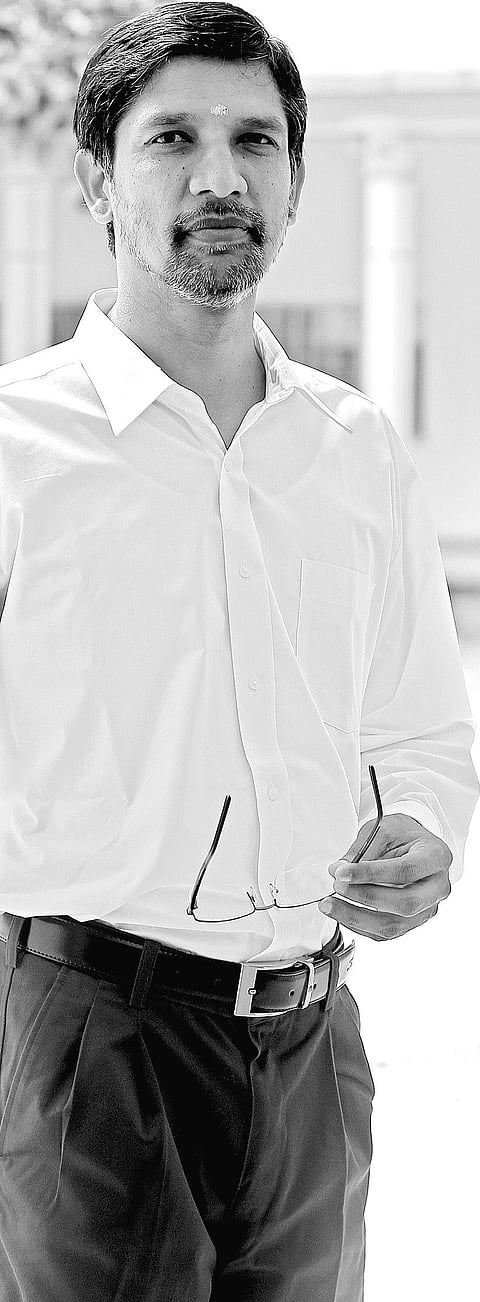

Soft and well-spoken, Raghu Raman is currently the Chairman of Amrita School of Business at their Ettimadai campus near Coimbatore and believes in the basic philosophy of Amritanandamayi, “Education should not be just for living. Education should be for life.”
Humble beginnings
Raman grew up in New Delhi in an area completely dominated by the middle class. His father was a Government servant while his mother was a homemaker. He says, “I was fortunate enough to get into Delhi Tamil Education Association Senior Secondary School, which is one of the most prestigious Government-aided schools in India. With very little career counselling, I joined Delhi University for their UG programme in Mathematical Statistics. Those days, most of the students opted for traditional subjects like Mathematics, Physics and Chemistry, but I chose a completely new area. Right after graduating, I had the choice of joining Indian Statistical Institute or opting for a Master’s programme in Computer Applications at Jawaharlal Nehru University, Delhi. I chose the latter and with that my journey towards the world of ICT (Information and Computer Technology) began. Raman received the President of India Gold medal on completing his undergraduate education at University of Delhi.
The take-off
Raman always wanted to study and work abroad but didn’t have the wherewithal. His professional career took off at a Fortune 500 company in Silicon Valley, US, called Informix Inc, the second biggest database company in the world. The next 10 years, he considers the best part of his professional life. Having worked with a fire in his belly, he was promoted every year, and within six years was given full responsibility for product development. “It was a great surprise when management recommended a fully-funded MBA for me at HaaS Berkeley School. It was a dream-come-true for someone like me who couldn’t have afforded this education before. As soon as I finished by MBA (1989), Informix was acquired by IBM and that provided an opportunity for me to make my next move,” he says.
With the Dot com wave in full strength in Silicon Valley, he decided to venture into the world of startups and joined NEC Research Labs as an Entrepreneur-in-Residence. The next four years was an entrepreneurial journey through three different startups finally resulting in a new venture (vidient.com) for which he raised over $17 million.
His homecoming
By then he had gained professional experience and a degree from an Ivy League institution. He had been associated with Mata Amritanandamayi’s organisation from 2004 on the Tsunami relief work and in 2005, he approached the spiritual leader to join her university in India and was welcomed with open arms.
A technologist by nature and qualification, Prof Raman established the Centre for Research in Advanced Technologies for Education (CREATE), an affordable and accessible educational technology initiative pioneered by Amrita University, with over $4.6m in research funding and over 45 publications. “It was through CREATE that I was able to design and build affordable educational technologies for the rural poor. We then got funding to the tune of `20 crore from the Government of India. We had a huge impact in terms of providing affordable yet high quality 2D, 3D animations and simulated learning experience to over 85,000 students and 4,200 teachers from rural areas across the nation. Using government grants, we made this free for students and teachers. There was no formal certificate given,” he says.
For over five years, as CEO of Amrita Technologies, a high technology healthcare startup, Raman provided leadership that lead to a patented and CCHIT (The Certification Commission for Health Information Technology) certified Electronic Medical Record (a systematic collection of electronic health information about an individual patient or population) system with a global customer base. Prof Raman also holds a PhD in Management from Amrita School of Business. He serves as an Advisory Editor for the Journal of Educational Technology & Society; as Member Standing Committee, National Mission on Education through ICT (NMEICT); as Member, Board of Directors for Amrita Technology Business Incubator; as Member, National Resource Group for ICT in School Education and is the immediate past chair of IEEE Education Society Chapter, IEEE India Council.
“Having finished my PhD in Management, I was asked to head the Amrita School of Business. Ranked among the Top 50 B-Schools in the country including IIMs, our two-year MBA programme is approved by University Grants Commission and has outstanding faculty from world-class institutions like IIMs, Berkeley, Wharton, Kelloggs and XLRI. My immediate task was to put Amrita School of Business on the global map of B-Schools. We recently got funding from the World Bank in an emerging area of Big Data Analytics. I am currently focused on setting up research centres with outstanding international academicians in the areas of eGovernance Analytics, Social entrepreneurship and Humanitarian operations. There are very few private B-Schools in the country like Amrita which offer a PhD in Management. We have over 35 PhD scholars with an average work experience of nine years. With a membership to AACSB (Association to Advance Collegiate Schools of Business), a gold standard for B-Schools around the world, our goal is to get accredited within three years,” he says exuding pride.
Activities at Ettimadai
Prof Raman says that a paradigm shift is happening at the B-School in experiential learning through a pioneering programme called Amrita Live-in-Labs, wherein students get to live and experience the problems in the country’s villages. For two-six months, students work towards understanding rural problems in areas like health, hygiene, energy, water, waste and the environment. They then define projects to seek to address these problems, implement, test and eventually demonstrate innovative students. He also ensures they get to study about Self Awareness and Personal Growth, Management beyond Profit, Management of Self for Success and Happiness and Cross-Cultural Management. “The idea is to encourage MBA students to go beyond the focus on the ‘bottom line’ and use their management skills to create value for people at the so-called ‘bottom of the pyramid’.preethomas@gmail.com